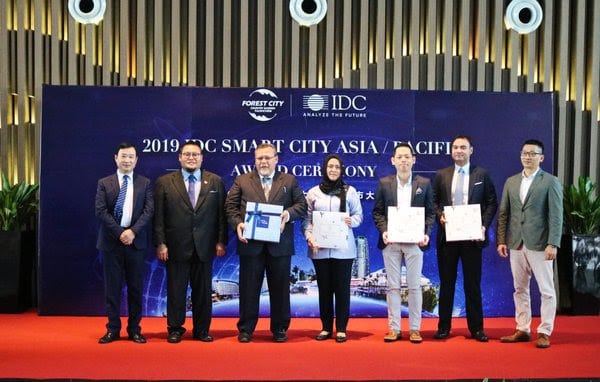Forest City, a smart and green industrial city located in the fast-growing Iskandar Development Region of Malaysia, notched another key milestone.
Last month, it was the only participant from Malaysia to win an award in the 5th International Data Corporation (IDC) Smart City Asia Pacific Awards (SCAPA).
Forest City outshined other contenders with its innovative "Smart B.I.A" system.
Jointly developed by Country Garden Pacificview (CGPV) and the Johor government-backed Esplanade Danga 88 Sdn Bhd (EDSB), Forest City plans to develop eight major industries, including Tourism & MICE, Healthcare, Education & Training, Regional Headquarters, Nearshore Finance, E-Commerce, Emerging Technology and Green & Smart industry, combining environment, technology and industry integration design concept to establish an ideal and technology-driven living and working space, building a prime model of future cities.
Johor Education, Human Resource, Science and Technology committee chairman Aminolhuda Hassan, who witnessed the award presentation, said that having a dedicated, diligent and committed workforce is also to be celebrated as it supports the B.I.A smart system.
"Building a smart city calls for strong commitment and financial resources. It is not easy as it also requires collaboration from the government, administrators, private developer and the community," Aminolhuda said.
Taking smart buildings to a whole new level
Speaking about Forest City’s innovative smart B.I.A system, Syarul Izam Sarifudin, CGPV general manager of Development Department, said the system “integrates new technologies such as BIM-IoT-AI, integrates BIM building information modelling, IoT sensing platform, and AI city applications, including green drip irrigation systems, building automation systems, intelligent security systems, smart metres, emergency systems, community robots and multiple systems”.
"Besides that, the implementation of Building Information Modelling (BIM) in the development of Forest City plays a crucial role in project design quality improvement, sustainable construction, and facility and asset management (FM/AM),” he added.
“Through the virtual 3D building model creation, BIM model keeps track of the constructed project to ensure all design changes can be checked before they are applied for the project delivery to minimize errors and rework on site. Forest City utilises BIM data for standardised production. Some building components can be completed in advance in Industrialised Building System (IBS) prefabricated factory, which effectively improves the building quality and standards, as well as reducing environmental pollution from construction sites," Syarul Izam said.
In terms of smart building management, Forest City has incorporated remote digital management through the IoT sensing platform, including smart metres, building monitoring and green wall.
The exterior wall of Forest City building is fully covered with vertical greening, equipped with an automatic irrigation system. The system will provide ideal amount of water for the plant through automated online monitoring network, significantly improving the efficiency, ecological and environmental benefits of the building. Moreover, efficient management such as comprehensive control of building security and energy consumption, can be achieved with the AI city application.
Recognising excellence
Gerald Wang, IDC lead analyst for smart cities said the "Smart B.I.A" system in Forest City was supporting the infrastructure construction through emerging technologies, providing services to the public and driving economic development, which is the focus of Malaysia's digital economy.
"The concept of smart city is the interpretation of how digital technology can provide innovative and intelligent solutions to overcome the challenges that existing and future cities will face."
Since 2015, some of the annual contenders for these awards include Government Technology Agency of Singapore, Taipei City Government, and various municipal governments of the People's Republic of China (Shenzhen, Shanghai, Beijing), Digital Economy Promotion Agency (Thailand); various municipal governments of South Korea (Incheon, Daejeon, Busan); New South Wales Government (Australia); and various municipal governments of New Zealand (Auckland, Christchurch, Wellington).



